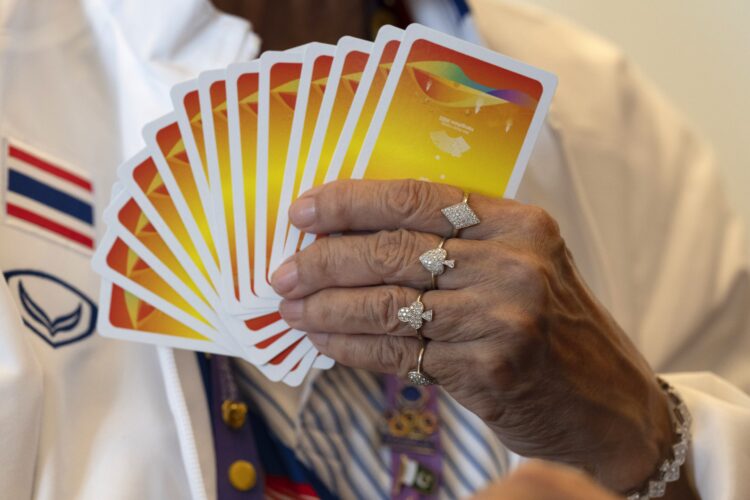Sporting playing card-themed jewelry, Manthanee Yaisawang of Thailand participated in the Women’s Bridge Team Round Robin event against India at the 19th Asian Games in Hangzhou, China on Wednesday, Sept. 27, 2023. The historical game of Bridge has found its place as a unique type of “esport” in the Asian Games, with “e” symbolizing “elderly” instead of “electronic”, thus breaking from the trend of the youth-oriented, video-gaming contests that have seen exponential growth in revenue and fame, with esports personalities like South Korean pro gamer Faker emerging. (AP Photo/Ng Han Guan)
From HANGZHOU, China (AP) — The Asian Games introduces another variant of the esport genre with the age-old card game, Bridge.
Here, the “e” is related to the “elderly”, referring to the game’s older audience, unlike the “electronic” esports of the youth that have evolved into some of the Asian Games’ most-watched competitions, attracting billion-dollar global revenues each year, and launching esports figures like the South Korean League of Legends’ “Faker.”
Alongside esports and chess, bridge is considered a ‘mind sport’ that has earned full medal status at the Asian Games’ two-week event.
Even as Kelvin Ong, head of the Singapore Bridge Association, bemoans the challenge of enticing younger generations to the game of bridge, he himself is engrossed in a tablet video game.
Ong, 37, self-consciously promises to “shut it down,”, recognizing the irony. He observes, “I think bridge is losing its appeal to the younger generation due to the rise of computer games, mobile games.”
Ong comments how the present generation prefers action that’s “flashy and quick — 30 seconds,”, noting that a game of bridge lasts around seven to eight minutes. He concedes that unless someone can make a bridge hand last for just a minute, the game won’t catch on, but hastens to add that it could deter the essence of the game.
Asian Games’ bridge is the very opposite of the quick and flashy; it is more measured and thoughtful. Plus, it does not necessitate physical prowess. Intriguingly, it is one of the many sports/games that is not a part of the Olympics.
Out of the approximate 200 participants, at least nine are over 70. Pakistan’s 78-year-old Masood Mazhar is the oldest, while the youngest is 13-year-old Chinese gold-winning skateboarder Cui Chenxi.
Anal Shah, coach and non-playing captain of the Indian women’s team, explains at 64 years old that bridge has no expiry “You can play until you’re 100,”. This sentiment is echoed by the manager of the Pakistan team, Dr. Raheel Ahmed, a radiologist, who says “There’s no retirement age.”
The average age of the participants in this tournament is around 50, with the youngest players being Vidhya Patel of India, 22, and Taiwan’s Chen Kuan-hsuan, 23.
Chen started learning the game at the age of eight, as her mother, a primary school teacher, insisted on it. “She had summer classes teaching students bridge,” Chen shares, “I didn’t want to learn, wanting to enjoy my summer holidays. But my mother was adamant.”
The bridge venue is located on the 12th and 13th floors of an office building in Hangzhou. The setting exudes silence, with four players seated at dozens of small tables. A screen is placed diagonally across each table to prevent players from passing signals to their teammates. The universal English game terminology like “no trump, slam, pass” eliminates any language barriers.
Large television screens display the dealt hands and their gameplay. Ong notes that outside of competitions, some bridge teams have been seen resorting to “kick, cough and stomp” techniques to communicate with teammates—hence, the screens.
Besides the older player base, bridge has an image issue, especially in some parts of Asia. Shah notes, “In India, the general conception is that cards equal gambling. You have to convince parents it’s an intellectual game.” Even in Pakistan, a predominantly Muslim nation, Dr. Ahmed has a different approach to promote the game—“We don’t have any muscles in the brain, but by playing bridge you can see you can build the mind muscle,” he says. “In Islam we don’t like betting so most of the people connect card games with betting.”
